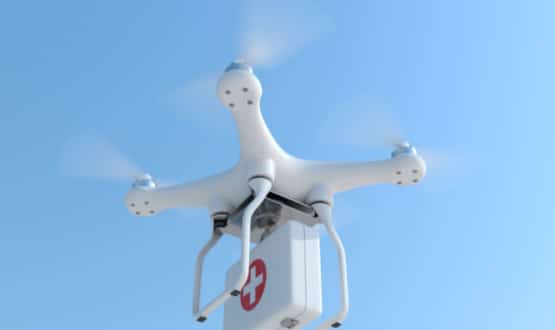A trial which will see chemotherapy being delivered by drone has been announced as the NHS celebrates 74 years since it was formed.
The drones are set to take flight in the coming weeks with the trial first being run on the Isle of Wight. Chemo will be flown directly from a pharmacy at Portsmouth Hospitals University NHS Trust to St Mary’s Hospital on the Isle of Wight, where staff will collect it before distributing it to hospital teams and patients.
Chemotherapy is difficult to transport as some doses have a short shelf life so the NHS partnered with tech company Apian to come up with a new way of getting the treatment to patients in record time.
Drones will cut the usual delivery time from four hours to 30 minutes, saving fuel and money and making cancer care much more convenient for patients living on the Isle of Wight who often need to travel to the mainland for treatment at the moment.
The trial is a joint effort between Isle of Wight NHS Trust, Portsmouth Hospitals University NHS Trust, Solent Transport, University of Southampton, King’s College London, Skylift, Modini, the Ministry of Defence, UK Research and Innovation and Apian.
Darren Cattell, CEO at Isle of Wight NHS Trust, said: “The Island has a long history of innovation. We are excited to continue that tradition by utilising the latest technology to overcome the challenges we face and to provide the very best service to our patients.
“We are still at a relatively early stage but the use of drones to transport medical supplies is a concept that has radical and positive implications for both the NHS and for patients across the UK as well as the Isle of Wight. It is great to be part of this innovative project.”
The drone programme will be trialled initially in the Isle of Wight followed by Northumbria and could allow clinicians to make “same-day orders” for vital medical equipment and other treatments.
Matt Whitty, chief executive of the Accelerated Access Collaborative and Director for Innovation, Research and Life Sciences at NHS England, said: “It’s a pleasure to see an innovation that began as an idea from talented NHS staff become a reality with such huge potential, and all with the support of our Accelerated Access Collaborative programmes.
“Apian was supported by the NHS Clinical Entrepreneur Programme (CEP) which provides support to entrepreneurial NHS staff helping nurture innovation within the NHS and then they received funding support from our Small Business Research Initiative Healthcare Awards. The first-ever drone delivery of chemotherapy will show the very best of the impact that innovation can have on patient care as well as contributing to supporting the NHS’s net-zero goals.”
This announcement follows University Hospitals Plymouth NHS Trust working in conjunction with the University of Plymouth to develop the use of smartwatches to monitor Parkinson’s patients at home. Using a device, known as a Parkinson’s Kinetigraph (PKG), a patient’s movements can be closely monitored while they’re at home. Doctors can then assess the data gathered to look for signs that interventions may be needed, such as changing medications or offering physiotherapy.

